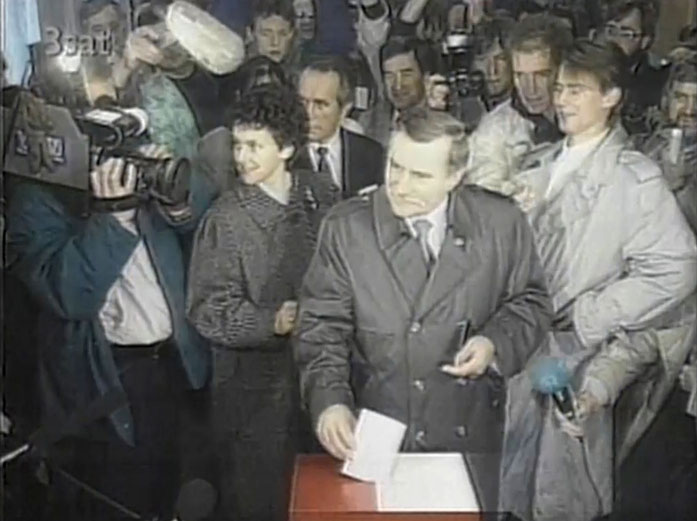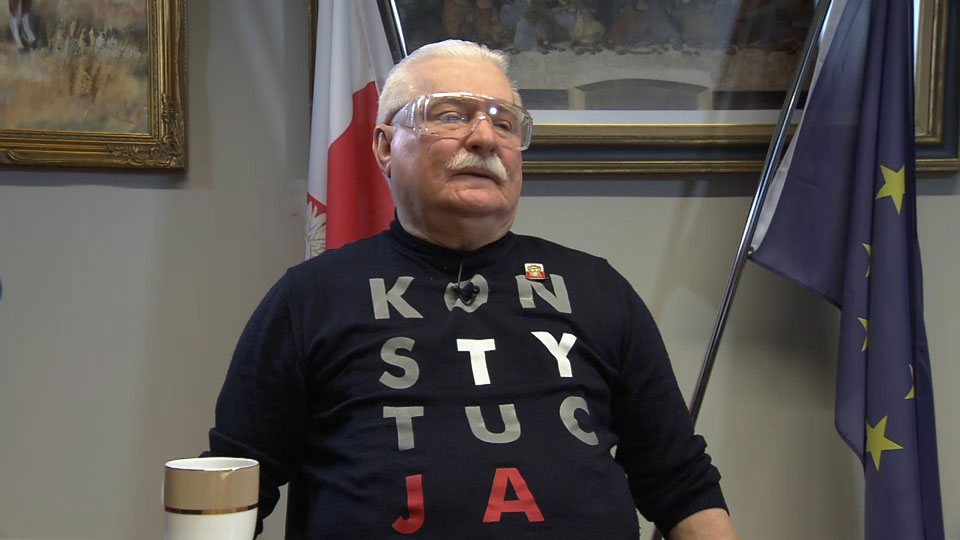"Many people are demanding change worldwide"
In the 1980s, Walesa was the leader of Poland's Solidarity movement, the first independent labor union in an Eastern Bloc country. For his efforts, he was awarded the 1983 Nobel Peace Prize. After the end of the Cold War, he became the first democratically elected president of Poland, serving from 1990 to 1995.
Recently, he has become a vocal critic of the current class of populist politicians rising to power around the world.
"Politicians around the world have failed to come up with solutions suitable to modern times. And as a result, the demons of the past have awakened. The masses are calling for change and they are electing politicians who promise it. That's how Donald Trump, how the French president, how the Polish government came to power. And these figures have made the right diagnosis: the world needs change. But the cure they offer, the medicine, is completely wrong. They are solving these modern problems by drawing on solutions of the past."
"Dialogue is necessary"
During the Cold War, Walesa was repeatedly jailed by the Soviet-backed Polish communist government. And though the Soviet Union has long since collapsed, Russia continues to cast a long shadow over the region.
"The influence of Russia is a fact of life for the countries of the region. It will always be there. So we should try to help Russia. And in order to do that, we should organize and come up with measures that will allow Russia to be like any other free country."
He adds: "We should not fight Russia. We should not try to denigrate Russia but instead we should discuss and talk about the right solutions."

Unlike post-Soviet Europe, China has largely kept its communist framework in place. Though there have been periodic flare-ups of movements similar to pro-democracy uprisings in communist Eastern Europe, such as the Tiananmen Square protests of 1989, change does not seem to be on the way. But Walesa says we should keep our eyes on what happens there.
"China is no longer a fully communist state, that is true. But they are also not a country of freedom and democracy. We want China to become democratic and free but it is a big country and needs to be allowed to make that change at its own pace, a pace of change and a pace of fighting for change that suits the country."
But the issue of pace has become irrelevant for the people of Hong Kong, for whom the fight for freedom is very much a matter of now. Walesa has been keeping up with the pro-democracy movement. He says he hopes the protesters learn from the history of Solidarity and Poland.
"I want the protesters in Hong Kong to understand that every fight consists of several stages. In the 40s and 50s in Poland, we were fighting with weapons. In the 60s and 70s, we organized strikes and violently demonstrated on the streets. In the end, we lost. We eventually realized that peaceful strikes are the most effective way to fight for change. We stayed inside at our workplaces and this helped foster a feeling of global solidarity. That's how we won. If we continued fighting in the streets, they would have murdered us."
He adds: "We understood that we were not fighting with communism itself but rather with distortions and mistakes within the system. This later became part of Gorbachev's platform in the Soviet Union: perestroika and glasnost. This was his idea for how to repair communism."
Walesa stresses the need for the countries of the world to lend their help.
"The people of Hong Kong are right to protest, and I believe they are going to win. The problem is how long will this state of uncertainty continue, and what is the price they will have to pay? I believe it's crucial for them to build up a base of global solidarity. What do I mean by solidarity? It's based on a simple philosophical belief: if you cannot lift a heavy burden on your own, you have to ask for help. In Poland, we had the burden of communism. So we called on the whole world to help us and we won. In Hong Kong, they must do the same but they also need to be careful so as not to pay too high a price for their fight."
"A stubborn revolutionary"
Recently, Walesa has become known for a unique sartorial choice. He wears the same thing every day: a T-shirt emblazoned with the word Konstytucya, or constitution.
"What I mean by wearing this T-shirt is that in Poland, we neglected democracy and now here we are: an irresponsible, populist group in power, continuously breaking our laws and constitution. So I want to tell the world: Do not neglect democracy because you may end up in the same situation, where the populist groups grab power and you might have as much trouble as we have in Poland. I'm going to wear this T-shirt everywhere until the situation improves, even at events with dress codes. I am a stubborn revolutionary."
Technology changes the new era
Technology is one of the biggest differences between the world of today and the one of thirty years ago. The ubiquity of social media has made it possible for people to instantly exchange opinions. But critics say this has made it difficult to build consensus and has resulted in the election of political leaders with extreme beliefs.
"When we were fighting communism in Poland, I was constantly told that only nuclear war can change the status quo. And yet, we proved it was possible to win on peaceful terms. We changed the whole system. So when I am told now that it's not possible to find agreement and accord, I just say I've already heard it all."
He adds: "We should create bigger political and social organizations suitable for new technology. Either we come to an agreement or we destroy society. We have given power to demagogues, populists who propose wrong solutions. We have to replace them with better governments and better solutions."

"The Era of the Word"
Walesa says, despite the current situation, he still holds a strong belief in the power of discussion.
"The new era of information and globalization is coming. It's almost here. It will be very different from the previous era of division. Right now, though, we are somewhere in between: the old era has collapsed and the new era has not yet emerged. And I call this in between era the 'Era of the Word'. It is the era of discussion and it should be the time when we decide what the future of our countries, of the world, looks like."
He stresses that the world needs to work together for a better future.
"The question is whether in the 'Era of the Word', will we be able to choose the correct solutions, the ones that are suitable for our times, and reject the wrong ones? And what foundations can we put in place for our future? In the past, we had separate foundations for every country. What we need now is a common global foundation."
Walesa believes part of the problem is how modern capitalism has left large groups of people without jobs, without hope. Part of the challenge of creating a new era of democracy, he says, is to make sure these people are not forgotten and that everyone gets to take part and share in the power of discussion.

